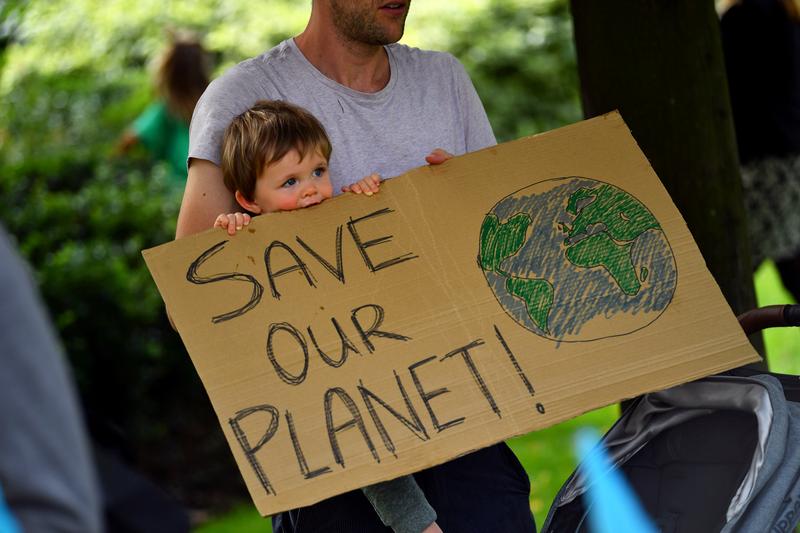Limiting Global Warming To 1.5 Degrees Is Not Plausible: Report
Feb 2, 2023 | Pratirodh Bureau
A father and his child hold a sign at a protest by climate activists in London, Britain (Representational Image)
Limiting global warming to 1.5 degrees Celsius is currently not plausible, according to a new report.
Climate policy, protests, and the Ukraine crisis – the participating researchers systematically assessed to what extent social changes are already underway, while also analyzing certain physical processes frequently discussed as tipping points.
The researchers concluded that social change is essential to meeting the temperature goals set in Paris. But what has been achieved to date is insufficient, they said.
Accordingly, climate adaptation will also have to be approached from a new angle, said the report.
The central report was released by Universitt Hamburg’s Cluster of Excellence “Climate, Climatic Change, and Society” (CLICCS).
The interdisciplinary team of researchers addressed ten important drivers of social change, the report said.
“Actually, when it comes to climate protection, some things have now been set in motion. But if you look at the development of social processes in detail, keeping global warming under 1.5 degrees still isn’t plausible,” says CLICCS Speaker Anita Engels.
According to the Hamburg Climate Futures Outlook, especially consumption patterns and corporate responses are slowing urgently needed climate protection measures.
Other key factors like UN climate policy, legislation, climate protests and divestment from the fossil fuels are supporting efforts to meet the climate goals.
As the analysis showed, however, this positive dynamic alone won’t suffice to stay within the 1.5-degree limit. “The deep decarbonization required is simply progressing too slowly,” said Engels.
In addition, the research team assessed certain physical processes that are frequently discussed as tipping points, such as the loss of the Arctic sea ice and melting ice sheets, which are serious developments, as are regional climate changes.
But they will have very little influence on the global temperature until 2050, they said.
In this regard, a thawing permafrost, weakened Atlantic Meridional Overturning Circulation (AMOC), and the loss of the Amazon Forest are more important factors, albeit only moderately, the report said.
“The fact is that these feared tipping points could drastically change the conditions for life on Earth — but they’re largely irrelevant for reaching the Paris Agreement temperature goals,” said CLICCS Co-Speaker Jochem Marotzke from the Max Planck Institute for Meteorology, Germany.
The report also covered COVID-19 and the Russian invasion of Ukraine. Economic reconstruction programs have reinforced dependence on fossil fuels, which means the necessary changes are now less plausible than previously assumed, the report said.
In contrast, whether efforts to safeguard Europe’s power supply and the international community’s attempts to become independent of Russian gas will undermine or accelerate the phasing out of fossil fuels in the long run remains unclear, the report said.
The Outlook is currently the only assessment that interlinks social sciences and natural sciences analysis in an integrated study to assess the plausibility of certain climate futures, the report said.
More than 60 experts have contributed, it said.
According to the report, the best hope for shaping a positive climate future lies in the ability of society to make fundamental changes, or “human agency”.
In addition, the Outlook reveals a range of conditions for doing so, for instance that transnational initiatives and non-government actors continue to support climate protection, and that protests keep up the pressure on politicians.
“The question of what is not just theoretically possible, but also plausible, that is, can realistically be expected, offers us new points of departure,” said Engels.
“If we fail to meet the climate goals, adapting to the impacts will become all the more important,” said Engels.
In this regard, the Hamburg Climate Futures Outlook introduced a new tool for testing the long-term effects of various measures, the report said.
“In order to be equipped for a warmer world, we have to anticipate changes, get the affected parties on board, and take advantage of local knowledge. Instead of just reacting, we need to begin an active transformation here and now,” said Engels.
